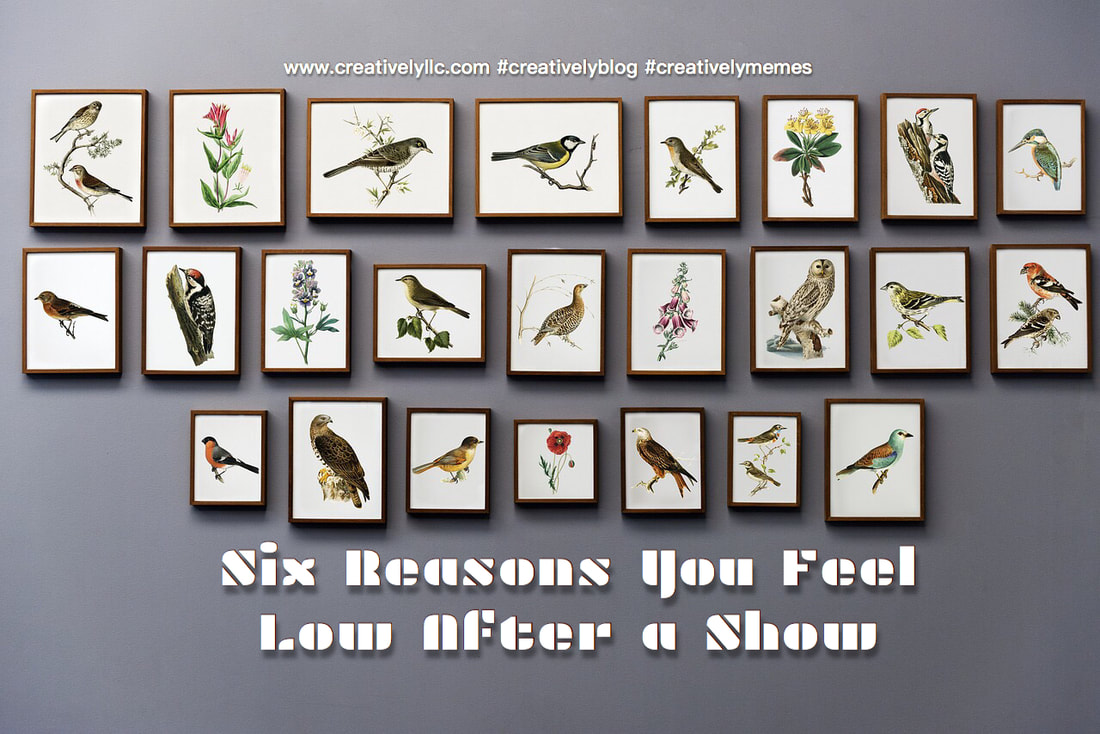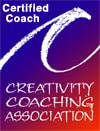|
Six reasons why you feel emotionally drained after an art show
Have you ever been in an exhibit, show, critique, concert, performance or other display of your creative work? Did you anticipate it and invite friends and family to share in your moment? Did you expect to feel accomplished, proud and satisfied? Were you disappointed? Did you feel drained, let down or upset? Sometimes it is as subtle as being off your routine afterwards, feeling irritable or not yourself. Guess what, Creative? This is normal. Let’s talk about the six reasons why you feel emotionally drained after an art show: 1. You are in the ebb of your creative cycle. Creating something requires you to invest your energy into something else- removing it from you to give that thing life - and oftentimes a show is preceded by a creative push to prepare for it. The end result is feeling drained of energy and at a low/less productive point in your creative cycle (for more about the natural creative cycle- look at the “Creative Cycle” blog post). 2. You feel exposed. Your baby is out of your arms! There is a very real separation anxiety that artists feel when separated from their work. You gave your work life, and it has left the safe place of its creation to go out into the world. Your alarm bells are ringing that it is outside your circle of protection. It may sound like we are over personifying your work here, but remember: the work is literally born and nurtured of your energy and so is a very real part of you that has been removed and put somewhere else without you. It is normal to have a visceral response to that. This feeling may be exasperated for you if you listed your art for sale (it’s never coming back!). 3. You feel vulnerable. Artwork is deeply personal. Creative people have a deep emotional capacity and you tap into that to produce your work. Whether you are writing, playing music, painting, drawing, dancing- whatever your modality- you are exposing very emotional and vulnerable parts of yourself in your work. Vulnerability begets anxiety in the form of an urge to protect and be watchful- a vigilance that is hard to maintain and becomes draining. 4. You feel judged. Maybe your show was curated and you respond to which of your submissions were chosen. Maybe all your pieces were presented in a group showing but you are reacting to where your work was placed, where in the performance order you performed, etc. Oftentimes shows are paired with awards from peers or judges. They may be categorized or given themes that surprise you or feel unnatural with your work. During the show you notice how people respond to your work. Who is looking? Are they whispering to each other? What do you overhear others say about it? Artists already are predisposed to harshly judge their own creative works and so this over- sensitized nerve responds negatively to being plucked further. 5. You are comparing out. This is also part of your human nature. It is a survival skill to perceive your place in a hierarchy. However, it does not serve you well creatively. It also doesn’t stop artists from doing it, which is another topic entirely. Creative people have internalized valuing systems like experience, technique, skill etc that socially are essentially used to categorize, rank and posture. I submit that in your own work there is a time to dispose of these things. What makes your work special is your unique voice in it, not the homogenized rules you have learned and copied from others. (If you are interested in finding and nurturing that unique voice, I am teaching techniques to help you do this in a new workshop at Root Studio). During a show, the tendency to compare is exasperated especially when you are showing with other artists. 6. You feel underwhelmed. This is really the product of the other five points. Shows are meant to be celebratory, and chances are those that attended your show that were not participating were very uplifted by your work. But, for all the reasons we have already explored, you may feel the opposite. After the event you are confused as to why you feel this way. You let in guilt and blame yourself for spoiling your special event. Your are at risk of your brain making a negative association with shows. If you don’t understand what is happening and can’t unpack it, then you will naturally start to avoid the discomfort and it will affect your ability and desire to participate in shows in the future. So, dear Creative, here are some things to do and remember during the times that you are showing your work: 1. Keep your insight. Know that energy depletion is a normal response to showing your work. It doesn’t mean you and your work are not safe and celebrated. Don’t give it the powers of mystery and meta-worry. Understanding and preparing yourself for the energetic let-down goes a long way. You are couching and soothing the experience and preventing a negative long term association (or debunking and healing one already held). 2. Self care, self care, self care. Leading up to, during and after your show, be hyper attentive to meeting your basic organismic needs. Eat enough good foods. Drink enough water. Get enough sleep. Attend to your basic hygiene. Stay around supportive people. 3. Get grounded. Get out of your headspace. Get away from any thought distortions and negative self-talk. Tap back into the energies in the world that naturally inspire you. Get outside. Find beauty. Stay in a normal routine but allow yourself to expect less from yourself during this time. Give yourself some positive self talk. Engage in creative projects that are exploratory and playful (process, not product focused- for more on that look at past blog posts!) 4. Remember, there are many audiences, shows and opportunities. You can choose for this to not be the last show you do. You can choose to do more. Volume takes pressure off of singularity. 5. Remember, you are not all things to all people. There is no “perfect” art or artist. Everyone sees art differently and that is part of the beauty of it. 6. Remember, you are evolving. Heraclitus much? The only constant in the world is change- and this applies to your art! Don’t love your art today? It is not a static thing. Allow it to grow and change with you and your life experiences. This is natural and healthy. 7. Remember, your work is valuable. There is a place in this world for your work and it is important. It’s uniqueness that is innately yours that is exciting and valuable. Showing and sharing your work is a sacrifice for you as a creative artist, but in its way, that makes it worth doing. It is important for the world to see your work and it is important for you as an artist to share it. Knowing what to expect will help you nurture and care for yourself during these important events. Have a show coming up? Just had one and and feeling stuck in a low place? Already have a negative association with shows you would like to unpack? I am here to help. (C) 2018 Creatively, LLC Comments are closed.
|
get more from The Creativity CoursesLiking educational topics and knowing what's hot in creativity? Creatively has online courses, with an interactive creative community, coaching sessions and more in the Creativity Courses. Want these blogposts in a newsletter? Subscribe here, and get a free gift. Cindy Cisnerosis a Creativity Coach, Creative Therapist and Professional Artist in Sykesville, Maryland. She is an expert straddling the realms of arts, creativity research, psychology, therapy, and coaching. She provides Online Creativity Counseling in Maryland and Virginia, and Online Creativity Coaching throughout the USA, Canada and the UK tailored for the discerning, imaginative, artistic, and neurodiverse. The information provided in this blog is from my own clinical experiences and training. It is intended to supplement your clinical care. Never make major life changes before consulting with your treatment team. If you are unsure of your safety or wellbeing, do not hesitate to get help immediately.
Archives
July 2024
|
|
Concierge Therapy for Creatives in Maryland
Creativity Coaching Worldwide including the USA, UK and Canada |
Telephone |
|


 RSS Feed
RSS Feed

